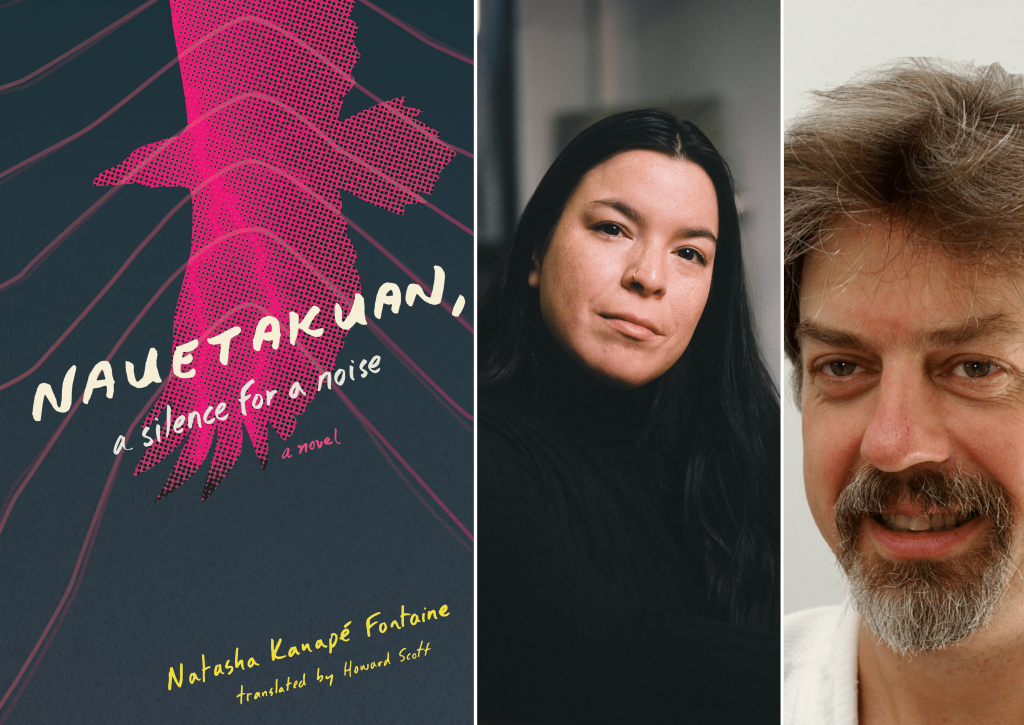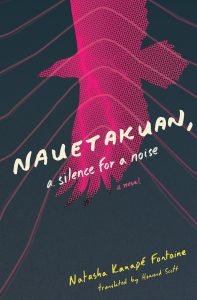Winter/Spring 2024 Fiction Preview: Nauetakuan, a Silence for a Noise by Natasha Kanapé-Fontaine, translated by Howard Scott

The next title in our Winter/Spring 2024 Fiction Preview is Nauetakuan, a Silence for a Noise by Natasha Kanapé-Fontaine, translated by Howard Scott!
Monica, a young woman studying art history in Montreal, has lost touch with her Innu roots. When an exhibition unexpectedly articulates a deep, intergenerational wound, she begins to search for a stronger connection to her Indigeneity. A quickly found friendship with Katherine, an Indigenous woman whose life is filled with culture and community, underscores for Monica the possibilities of turning from assimilation and toxic masculinity to something much deeper—and more universal than she expects.
Travelling across the continent, from Eastern Canada to Vancouver to Mexico City, Monica connects with other Indigenous artists and thinkers, learning about the power of traditional ways and the struggles of other Nations. Throughout these journeys, physical and creative, she is guided by visions of giant birds and ancestors, who draw her back home to Pessamit. Reckonings with family and floods await, but amidst strange tides, she reconnects to her language, Innu-aimun, and her people.
A timely and riveting story of reclamation, matriarchies, and the healing ability of traditional teachings, Nauetakuan, a Silence for a Noise underscores how reconnecting to lineage and community can transform Indigenous futures.
“A love letter to residential school survivors dedicated to their descendants… To create the universe of Nauetakuan, populated by giant animals and marvelous creatures, including the thunderbird, Natasha Kanapé Fontaine was inspired by her own dreams, various native myths, and ancient legends taught to her by Joséphine Bacon.” —Le Devoir
We’ve selected an excerpt from Nauetakuan to share today! The book will be released on June 11, 2024, and is available for pre-order from our online shop or from your local independent bookstore.

What is this in-between feeling? And yet she’s already seen this kind of show. All the same, in a way she can’t explain, she has a feeling of going through one initiation after another with Katherine. An initiation…or a return to something familiar but distant? Yes, in her early childhood, certainly, she spent time in this same world, that same atmosphere. She thinks she remembers her mother, who at the time was someone who loved being with people, who knew the artists from the communities, who loved being surrounded with friends and family… That was before she totally shut herself off. Before she moved with her daughter to Forestville, just before Monica started Grade 2. She took a job as a clerk in the convenience store farthest from the western entrance of the tiny town, in the direction of Pessamit.
Monica suffered a lot from that isolation, all the more because she was violently rejected, both in elementary and high school. She watched endless American teen movies, badly dubbed into French, but it was better than feeling lonely. She thought it was simply because she looked different, because she preferred to be alone, focusing on her drawing. She had deduced that hers was the fate of those who, for no particular reason, were born to be excluded. That she would never have the same chances as the others, she would simply have no chances at all. At the same time, she became convinced over the years that, as in the movies, since her journey was already strewn with pitfalls and solitude, she was destined for something exceptional.
I’d like to go back to the village and walk its streets again. Breathe in the fragrance of its trees when I get there, open the car windows and undo my seat belt. The effect of that scent courses through my body every time. It’s like recognizing your mother’s smell among thousands of women. My village is my mother. I have no other. Going home means going back to my peaceful childhood.
I want to throw myself into the arms of the past.
Ashini Street goes straight to the river, lined with places that are full of life. The presbytery and the church are still there, unmoving, loyal sentries on the shore, in the winds and tides. My grandparents’ house and my uncle’s house, side by side, bastions of my childhood summers. There, in the yard, my grandfather used to pluck partridges and hang them over a fire surrounded with big stones. He would stretch beaver pelts on frames made of branches, thread the sinews through the holes around the edges of the pelts to pull them tighter, and you could see the suppleness of the hide and the colours of the skin on the reverse, from pink to violet, like the hues of morning just before sunrise.
I’d like to be able to join him in the yard, cut through the little parking area to the left of the house, speak to him, see him turn toward me with his shining eyes, and I would walk softly toward him.
I’d like to tell him that I’m managing okay, that I’m looking for foundations, references, for a way in. I would like to be able to touch the beaver pelt again, feel the breeze rise as it welcomes the smell of fire and meat grilling. If I close my eyes, my dream will disappear. If I go forward, I will fall into the night.
____________________________________________________________________________________________
Natasha Kanapé Fontaine is an Innu writer, poet and interdisciplinary artist from Pessamit, on the Nitassinan (North Shore, Quebec). She lives in Tio’tia:ke, known as Montreal. Her critically acclaimed poetry and essays are widely taught and have been translated into several languages. In 2017, she received the Rights and Freedoms Award for her poetry and contribution to bringing people closer through art, writing, performance, dialogue, respect, and cultural exchange. In 2021, she received the Chevalier de l’Ordre des arts et des lettres de la République française. She also works as a translator, screenwriter, sensitivity reader, and consultant on Indigenous literature.
Howard Scott is a literary translator living in Montreal who translates fiction, poetry and non-fiction, often with Phyllis Aronoff. He received the Governor General’s Literary Award for Translation for The Euguelion by Louky Bersianik and, with Phyllis Aronoff, won the Quebec Writers’ Federation Translation Award for The Great Peace of Montreal of 1701 by Gilles Havard. The translating duo were also awarded a Governor General’s Literary Award for their translation of Descent into Night by Edem Awumey. Scott is past president of the Literary Translators’ Association of Canada.

